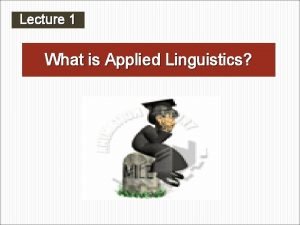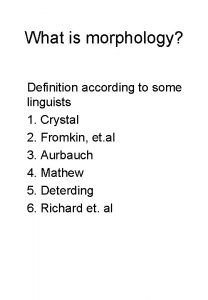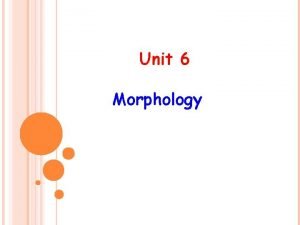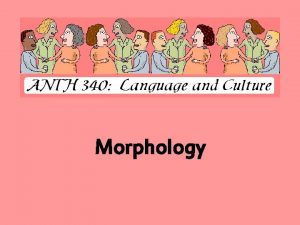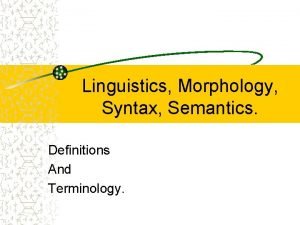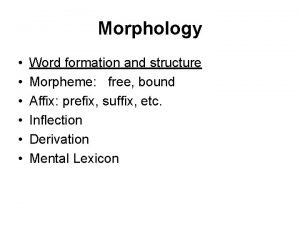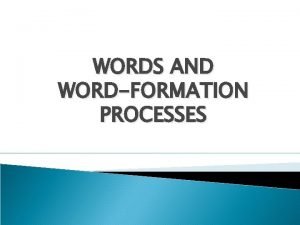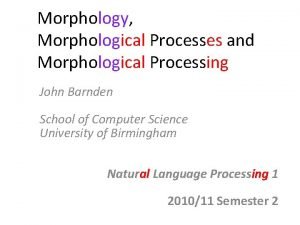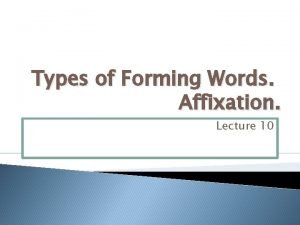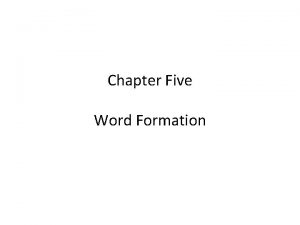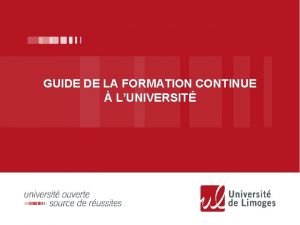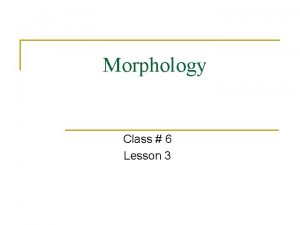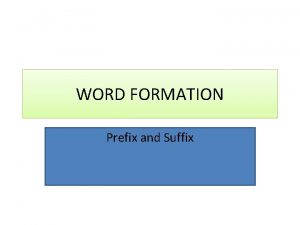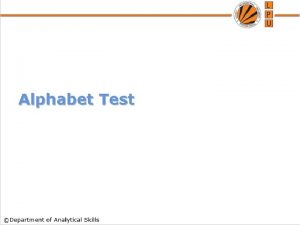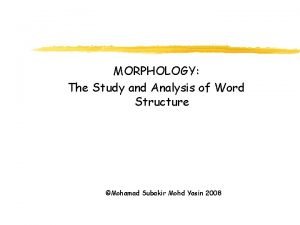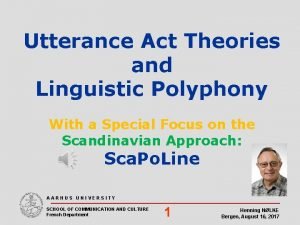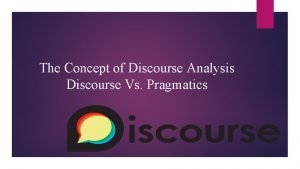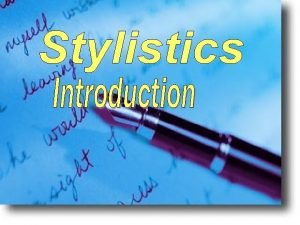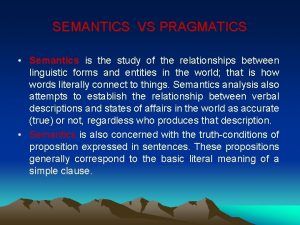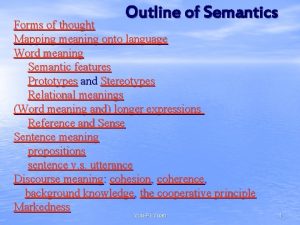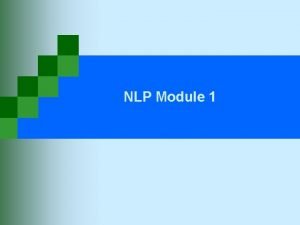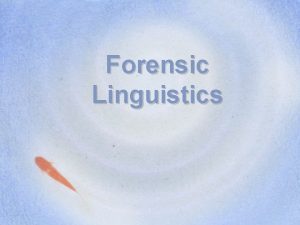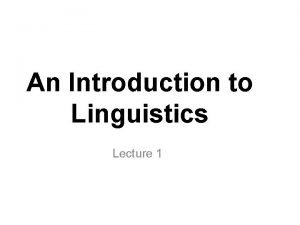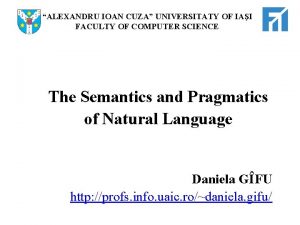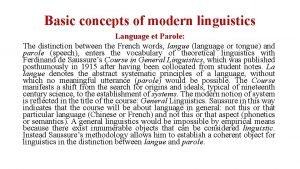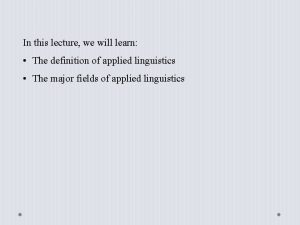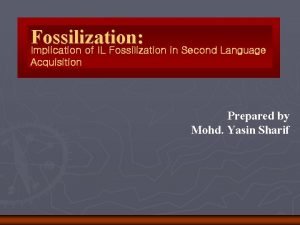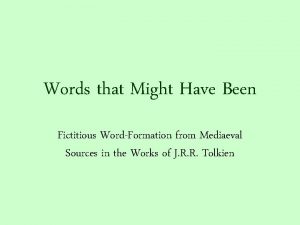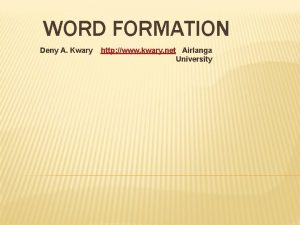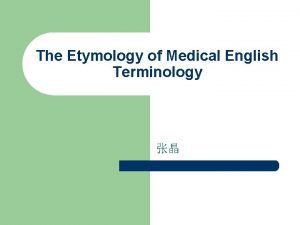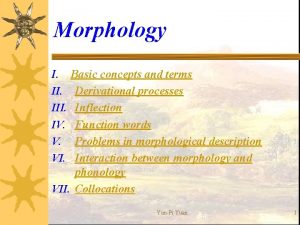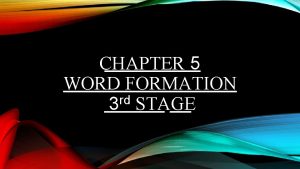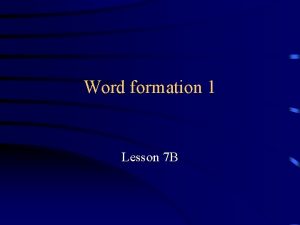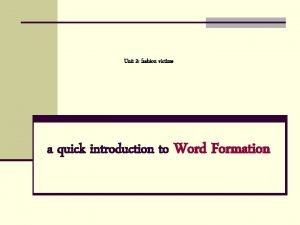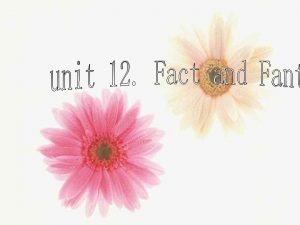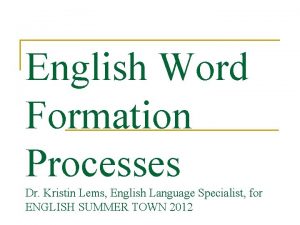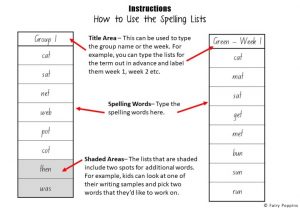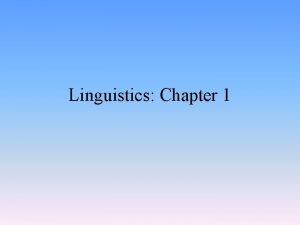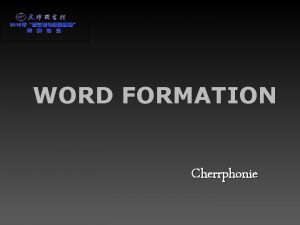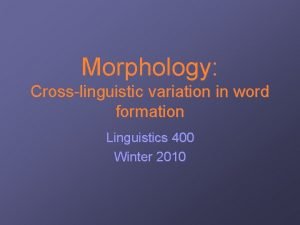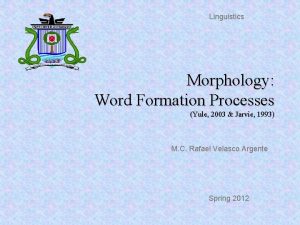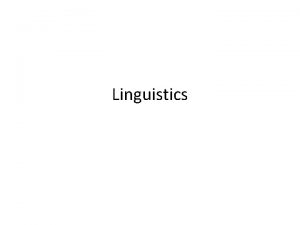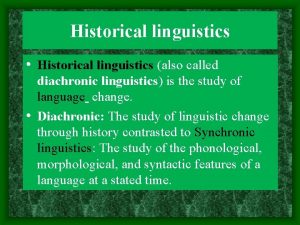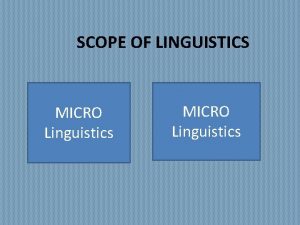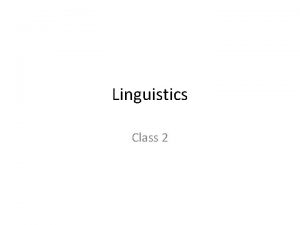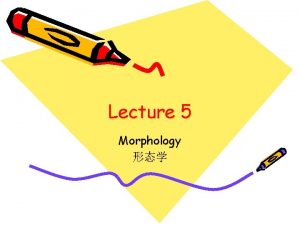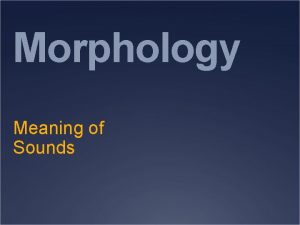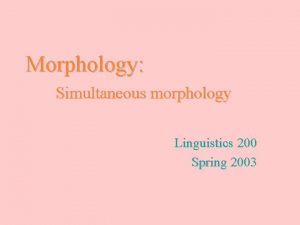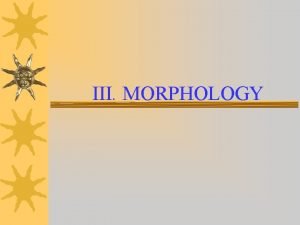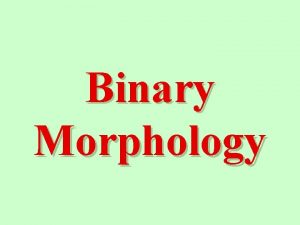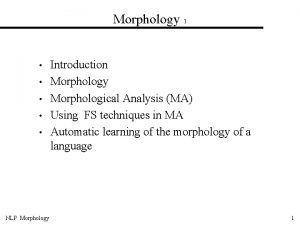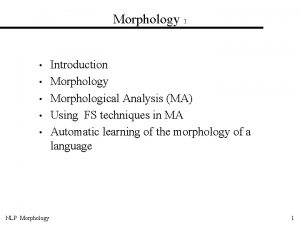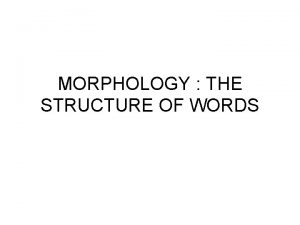Morphology and Word Formation Definition In linguistics morphology





















































- Slides: 53

Morphology and Word Formation

Definition • In linguistics, morphology is the study of words and how they are formed. • It analyzes the structure of words and parts of words, such as stems, root words, prefixes, and suffixes.

What is a morpheme? • Morpheme is defined as the smallest speech unit which has meaning. • a meaningful morphological unit of a language that cannot be further divided (e. g. in, come, -ing, forming incoming ).

Knowing how words are formed: 1. enables us to derive many vocabulary items from the same word (increase the wealth of vocabulary). 2. helps us understand or guess the meaning of unfamiliar words. For example (act - acting – activity – action – actor – activate - activation): they all share the meaning of the morpheme (act) which is "to do something".

Free and bound morphemes • Free morpheme: It is the morpheme that can occur as a single word with meaning as act in (actor). • Example: girl, system, desire, hope, act, phone, happy…etc.

Bound morpheme: • It is the morpheme that cannot stand alone as a single word as or in (actor). • It has meaning only when connected to other morphemes. un(uncover, undo), dis- (displeased, disconnect), pre(predetermine, prejudge). -er (singer, performer) -ist (typist, pianist) -ly (manly, friendly) (un- kind –ness)

Lexical and functional morphemes • Free morphemes fall into two categories. The first category is called lexical morphemes. • It is set of ordinary nouns, adjectives and verbs. • They carry the ‘content’ of the messages we convey.

Functional morphemes • Functional morphemes consist of functional words in the language such as conjunctions, prepositions, articles and pronouns. • Examples: • and, but, when, because, on, near, above, in, the, that, it, them.

Affixes: • English words can be classified into simple or complex. • A simple word consists of a free base morpheme; a complex word consists of a base morpheme and other elements (bound morphemes) that can be attached to the beginning or end of the bases.

• The word (unhappily) is made up of a base morpheme 'happy' and the bound morphemes are “un – ly”. • These elements are called "Affixes".

Affixes: are bound morphemes that can be attached to the beginning (prefixes) or the end of words (suffixes). [ affix ……… simple form ……. . affix]. un ………. happi ………… ly

Prefixes: are the parts we add to the beginning of a word. Suffixes: are the parts we add to the end of a word.

Derivational and inflectional morphemes

Derivational morphemes They can be suffixes or prefixes. They involve change in the word meaning and class (part of speech). Un + happy = unhappy (change in meaning) En + rich = enrich (change in class, adjective into verb)

Derivational affixes always precede inflectional ones if they come in the same word. For example: "modern-ize-s". No other affixes can be added after inflectional ones.

Inflectional Affixes (morphemes): are suffixes "elements that are added to the end of a word. ” They do not come at the beginning of a word. There are only 8 inflectional morphemes in English. 1 - They do not change the meaning or part of speech of the word. (boy/boys (n. ) – read / reads (v. ) – tall / taller / tallest (adj. ))

inflectional suffixes (morphemes) 1. Noun inflectional suffixes: (2 morphemes) (s) To mark plural To mark possession girl= girls Ali = Ali’s Boys = boys’

Verb Inflectional suffixes (4) (s) Third person with verb He plays football. (ed) Past tense marker (ed) Past participle marker He has eaten fish. (ing) Present participle He finished his work. He is writing now.

Adjective Inflectional suffixes: (er) Comparative Taller, bigger, faster (est) Superlative Tallest, biggest, fastest


Derivational and inflectional affixes can sometimes be identical. Example: “ing” inflectional: derivational: Writing is essential for academic works". he is writing.

Derivational Inflectional Prefixes and suffixes Only suffixes Derive new words Only shows difference in number, tense, possession Change in meaning No change in meaning Change in class No change in class (part of speech)

Morphs and allomorphs • Morph: A morph is simply the phonetic representation of a morpheme, how the morpheme is said. Cats - '-s' morpheme is pronounced /s/ Dogs - '-s' morpheme is pronounced /z/ Houses - '-s' morpheme is pronounced /ɪz/ This /s/, /z/, /iz/ are the different sound of same morpheme {-s}. 23

• Morpheme: Smallest meaningful unit, cannot be further divided or analyzed Ex: Unthinkable = 'un-' 'think' and '-able‘ Ex: Books = Book and s. • Allomorph: Allomorphs are different forms of the same morpheme, or basic unit of meaning. These can be different pronunciations or different spellings.

Positioning bound morphemes 1. Derivational morphemes can be prefixes or suffixes. 2. Inflectional morphemes are only suffixes. 3. At word can have at its end: a) two (sometimes more) derivational morphemes as in naturalize (nature + al +ize)

b) If a derivational morpheme and an inflectional morpheme come at the end of the word, only the inflectional morpheme ends the word. Example: 1. naturalizes: (nature (free) + - al (derivational) + - ize (derivational) + - s (inflectional))

Note: if a word ends in an inflectional morpheme, no other morpheme can be added to it. Examples: - cars: ends in – s (inflectional morpheme marking plural). No morpheme can be added to it. - He is the tallest. No morpheme can be added after – est, the superlative marker. - The came applies to all inflectional morphemes.

Word formation processes This refers to creating word out of ‘existing’ words. The following are the word formation processes in detail.

1. Compounding is the process of creating compounds by stringing together separate words in order to make new words. There are varied combinations of (nouns – adjectives – verbs and particles).

Types of compounds 1. Compound nouns: involve different parts a. Noun + noun: bath towel; boy-friend; death blow policeman, boyfriend, water tank, dining-table, bedroom, motorcycle, printer cartridge, bus stop, egg rolls

b. Verb + noun: pickpocket; breakfast, drive inn, fire place, guide book, handle bar, note book, pay day, post man, search engine, show room, watch man, taste buds, stop clock

c. Noun +verb: nosebleed; sunshine, sunrise, haircut, hairdo, spoon-feed

d. Verb +verb: make-believe, sleepwalk e. Adjective + noun: deep structure; fast-food, high school, smallpox, bluebird, greenhouse. f. Particle + noun: in-crowd; down-town, down stair, off shore, out patient, on line, over weight, underworld

g. Adverb + noun: now generation, onlooker bystander, afterthought, inside h. Verb + particle: cop-out; drop-out

2. Compound verbs a. Noun + verb: sky-dive b. Adjective + verb: fine-tune c. Particle + verb: overbook d. Adjective + noun: brown-bag

3. Compound adjectives a. Noun + adjective: card-carrying; childproof b. Verb + adjective: fail safe c. Adjective + adjective: open-ended d. Adverb + adjective: cross-modal e. Particle + adjective: over-qualified f. Noun + noun: coffee-table g. Verb + noun: roll-neck h. Adjective + noun: red-brick; blue-collar i. Particle + noun: in-depth j. Verb + verb: go-go; make-believe k. Adjective/Adverb + verb: high-rise; l. Verb + particle: see-through; tow-away

3. Coining/coinage (invention) • is the process where the new words are coined or invented from existing material to represent a new invention or development. • Examples: wireless, hypermarket, Aspirin, nylon, zipper, Teflon

• Some other words are used as the generic name for different brands (trademarks) of products, such as: • Kleenex, Xerox,

4. Borrowing • Borrowing: Taking words from other languages From other languages to English. • Examples: Alcohol (Arabic), Boss (Dutch), Piano (Italian), Robot (Czech), Yogurt (Turkish), Tycoon (Japanese).

5. Clipping • Some words are used in shortened form by subtracting one or more syllables from a word. This shortening sometimes occurs at the beginning of a word, at the end of a word, or at both ends of a word. • EXAMPLES § § § § § Shortened word. . . . Full word photo. . . photograph plane. . . aeroplane pram. . . perambulator bus. . . omnibus flu. . . . influenza phone. . . telephone hanky. . . handkerchief maths. . . mathematics lab. . . laboratory

6. Blends/blending • Two words are sometimes clipped and the clippings are joined to form a new word. EXAMPLES • brunch. . . from. . breakfast and lunch • smog. . . . from. . smoke and fog • telecast. . . . from. . television and broadcast • motel. . from. . . . motorists and hotel

7. Backformation A word of one type (may be noun) is reduced to another word of another type (may be verb) Television became televise, donation became donate,


8. Acronyms • An acronym is formed by joining together the initial letters (or sometimes a little larger parts) of other words and is pronounced as a word. Acronyms Full form AIDS Acquired Immuno Deficiency Syndrome BASIC Beginners All-purpose Symbolic Instruction Code (A computer language) B 2 C Business to Customer LASER Light Amplification by Simulated Emission of Radiation UNICEF United Nations International Children’s Emergency Fund UNESCO United Nations Educational Scientific and Cultural Organisation

• The difference between an acronym and an abbreviation is that the latter may be formed from the initial letters in a phrase on name and is read letter by letter, e. g. IBM, BA, M. Sc. , AD, and so on, while the former is formed from the first letter of each word and is normally pronounced as a word e. g. LASER, BASIC.

ROOT vs. STEM Roots are the cores 'hearts' of words or those parts of words that are not analysable into further morphemes. For instance: 'nature' is the root in the word 'naturalization' – it is the heart of this word.

Roots can either be free or bound 1. Free roots can appear alone in English in all parts of speech. All monosyllabic words are free roots such as 'cat, write, sad, near, room, create and fast. Also some multisyllabic words are free roots such as 'margin, pretty 2. 3.

q q q Bound roots cannot occur alone in speech as they carry no meaning. They combine forms from Latin origin and Greek; they often appear in English words of Latin and Greek origin such as 'geology' (geo+logy), 'predict' (pre+dict), 'conceive (co+ceive' and nonchalance.

Stem • The stem of a word is that part of the word to which the last morpheme is structurally added. • For example, • the word 'nature' is the stem of 'natural; • natural is the stem of naturalize; • and naturalize is the stem of naturalization.

• A root can also be a stem and a stem can be a root. • However, while all roots can be stems, not all stems are roots. For example; 'person' is both the stem and root of 'personal' is the stem but not the root of 'personality' as the root of 'personality' is 'person'.

The Difference between a Root and a Stem • "The terms root and stem are sometimes used interchangeably. However, there is a subtle difference between them.

• a root is a morpheme that expresses the basic meaning of a word and cannot be further divided into smaller morphemes

End of Section
 Traditional linguistics and modern linguistics
Traditional linguistics and modern linguistics Difference between linguistics and applied linguistics
Difference between linguistics and applied linguistics Inflectional morphology definition
Inflectional morphology definition Morphology
Morphology Types of morphology
Types of morphology Morphology definition linguistics
Morphology definition linguistics Whats a bound morpheme
Whats a bound morpheme What is morphology
What is morphology The word formation process
The word formation process Morphology process
Morphology process Coinage in morphology
Coinage in morphology Morphology meaning
Morphology meaning What is inflectional and derivational morphology
What is inflectional and derivational morphology Wat is een afleiding
Wat is een afleiding Affixation
Affixation Compound verb
Compound verb Kamhmu
Kamhmu Sauna ghassan
Sauna ghassan Formation initiale vs formation continue
Formation initiale vs formation continue Word tree diagram linguistics
Word tree diagram linguistics Word formation prefixes and suffixes
Word formation prefixes and suffixes Arrange the words in alphabetical order example
Arrange the words in alphabetical order example Derivative words
Derivative words Word sums morphology
Word sums morphology Word structure analysis
Word structure analysis Utterance linguistics
Utterance linguistics Concept of discourse
Concept of discourse What is style in stylistics
What is style in stylistics Difference between semantics and pragmatics
Difference between semantics and pragmatics Semantics
Semantics Meaning of semantics
Meaning of semantics Utterance definition linguistics
Utterance definition linguistics Pragmatic definition in linguistics
Pragmatic definition in linguistics Forensic linguist definition
Forensic linguist definition Cohesion vs coherence
Cohesion vs coherence Definition of language in linguistics
Definition of language in linguistics Pragmatics examples
Pragmatics examples Diachronic and synchronic approaches of language study
Diachronic and synchronic approaches of language study La langue and la parole
La langue and la parole Contrastive linguistics definition
Contrastive linguistics definition Linguistics definition
Linguistics definition Phonological fossilization
Phonological fossilization Dwimmer crafty
Dwimmer crafty Formation microsoft word
Formation microsoft word Eponyms examples
Eponyms examples Word formation lead
Word formation lead Rules for word formation
Rules for word formation Rules for word formation
Rules for word formation Sofa word formation
Sofa word formation Coinage in word formation
Coinage in word formation Deli word formation
Deli word formation Unit 2 fashion victims answers
Unit 2 fashion victims answers Word formation list
Word formation list Deli word formation
Deli word formation

